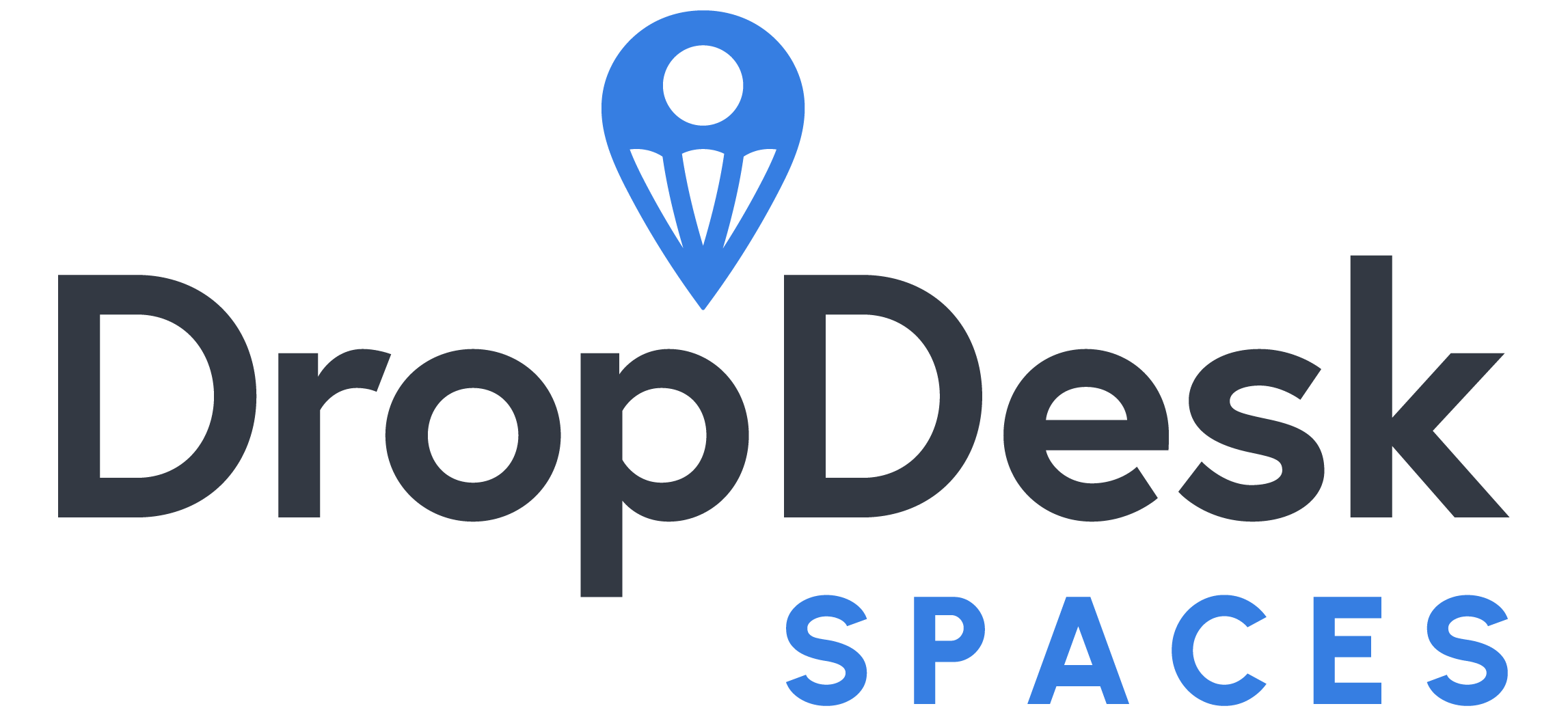What Is SEO?
SEO unlike paid marketing, stands for Search Engine Optimization. Its an ongoing process where you improve your websites performance and keyword rankings for the purpose of apperaing on the search engines. There are two main types of SEO which are on-site SEO and Offsite SEO.
On-site SEO
On-site SEO is the process by which you have total control over what optimizations you can make. As its name suggests, on-site SEO is the process by which you optimize you own website to create the best foundation for you to start tanking for your desired keywords.
On-site SEO Breakdown:
- SSL Certification On My Website
- Implement the correct Title Tags, Metadata, Url and Target keywords on your site
- Upload your website property to Google Search Console
- Create your .xml sitemap
- Add Google Analytics to your website
- Ensure images and content are compressed and being properly cached on your website
- Make sure your website page speed is on point
- Check to see how mobile optimized your website is
Interested in learning more about how to audit your site? Check out our friends at Ahrefs guide to On-Site SEO.
Off-site SEO
Off-site SEO is the process where ranking factors that occur “off-site” directly affect how you appear on the search engines. Because these factors are NOT under your complete control they can be tricky.
Off-site SEO Breakdown:
- Link building
- Local Directories
- Guest Posting
Why is SEO important for your coworking space?
Google handles 2 trillion to a quadrillion searches per year (and growing!). 46% of searches on Google are local, with 86% looking up the location of businesses on Google Maps.
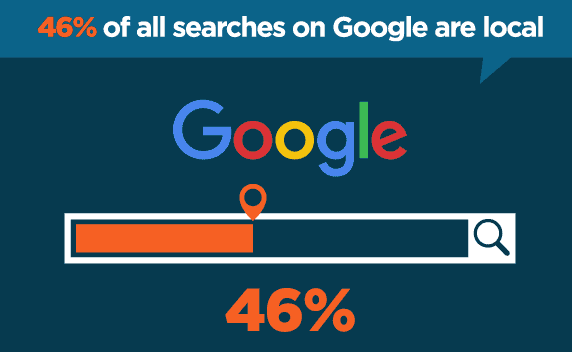
How does this relate to your coworking space? Well since your coworking space is a local business, by taking advantage of how users are searching for solutions to their problems you can easily attract new customers for your space. Local SEO helps customers in your area discover what you have to offer and builds trust with prospective members looking for what your spae offers.
Getting started with your coworking space SEO strategy
Before we start with the actionable tips such as keyword research, you first want to make sure that you have a website built where you can easily make edits to content.
Step 1. Google Search Console
Google Search Console is a free service (created by Google) that helps you understand how the search engine crawls your website, ranks pages, and what customers are typing in to find you. Based on these insights, you can quickly adapt your strategy to enhance what works.
Firstly, you want to “create a property” if you currently do not have an account on Google Search Console.
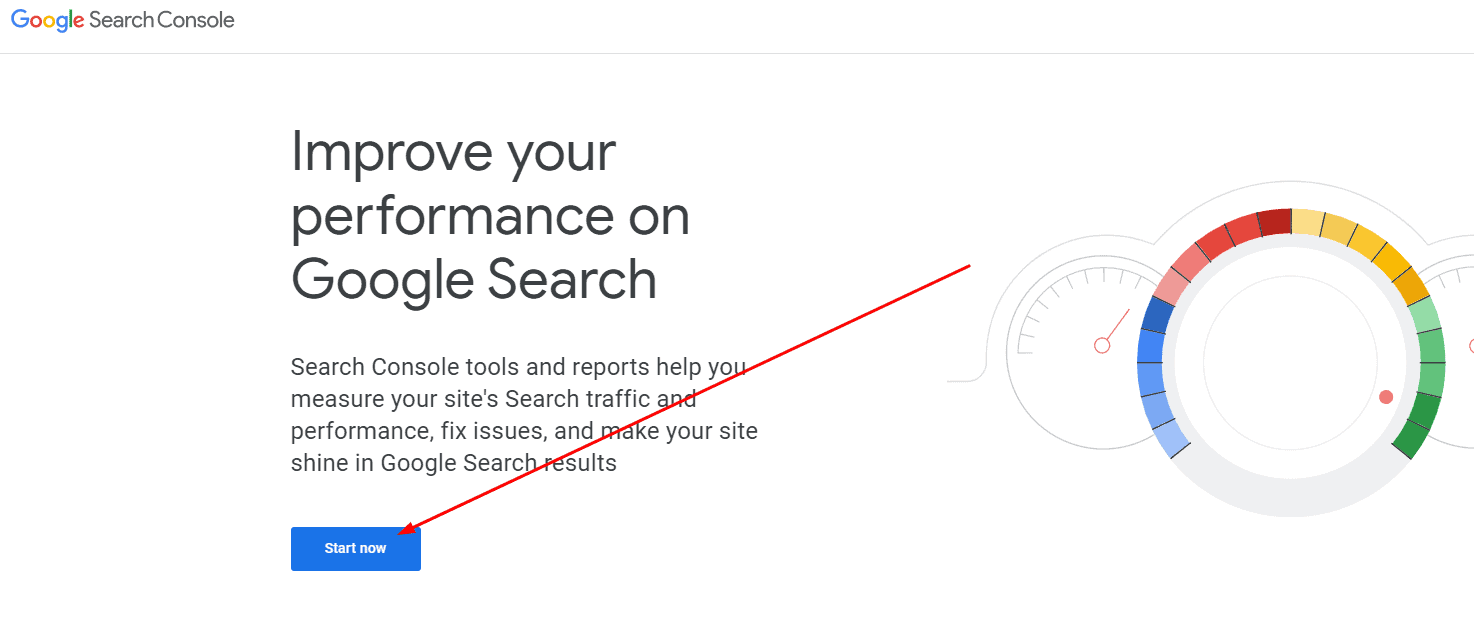
After you have created your account, next add the property
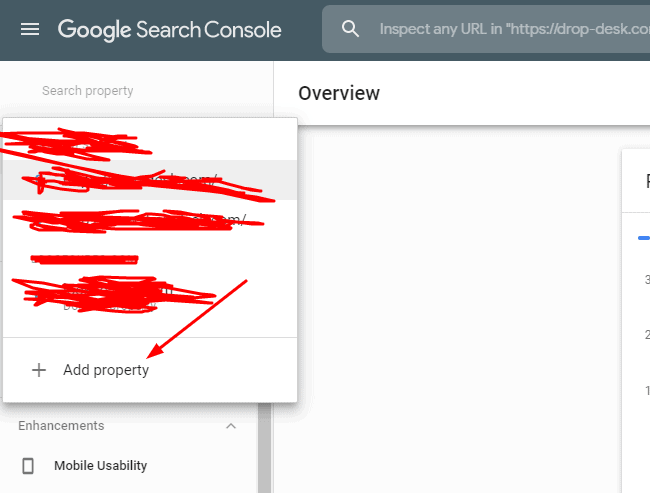
Lastly, verify the property using your DNS or by embedding the given code on your website.
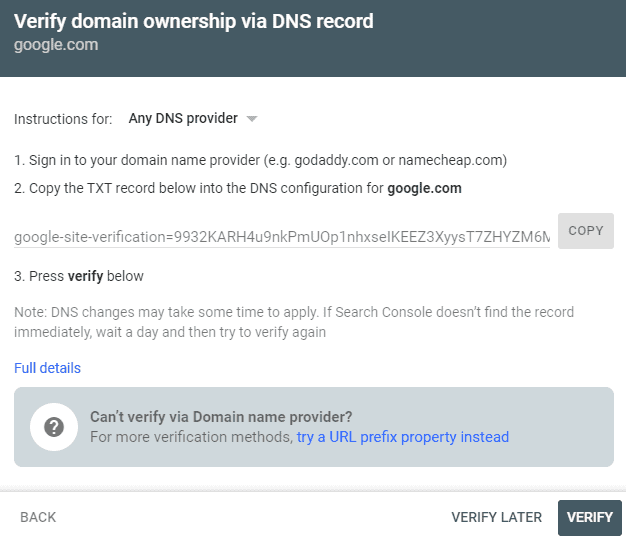
Once you have successfuly added your websites “property”, next lets dive into the insights of Google’s performance report to understand what types of information you can see.
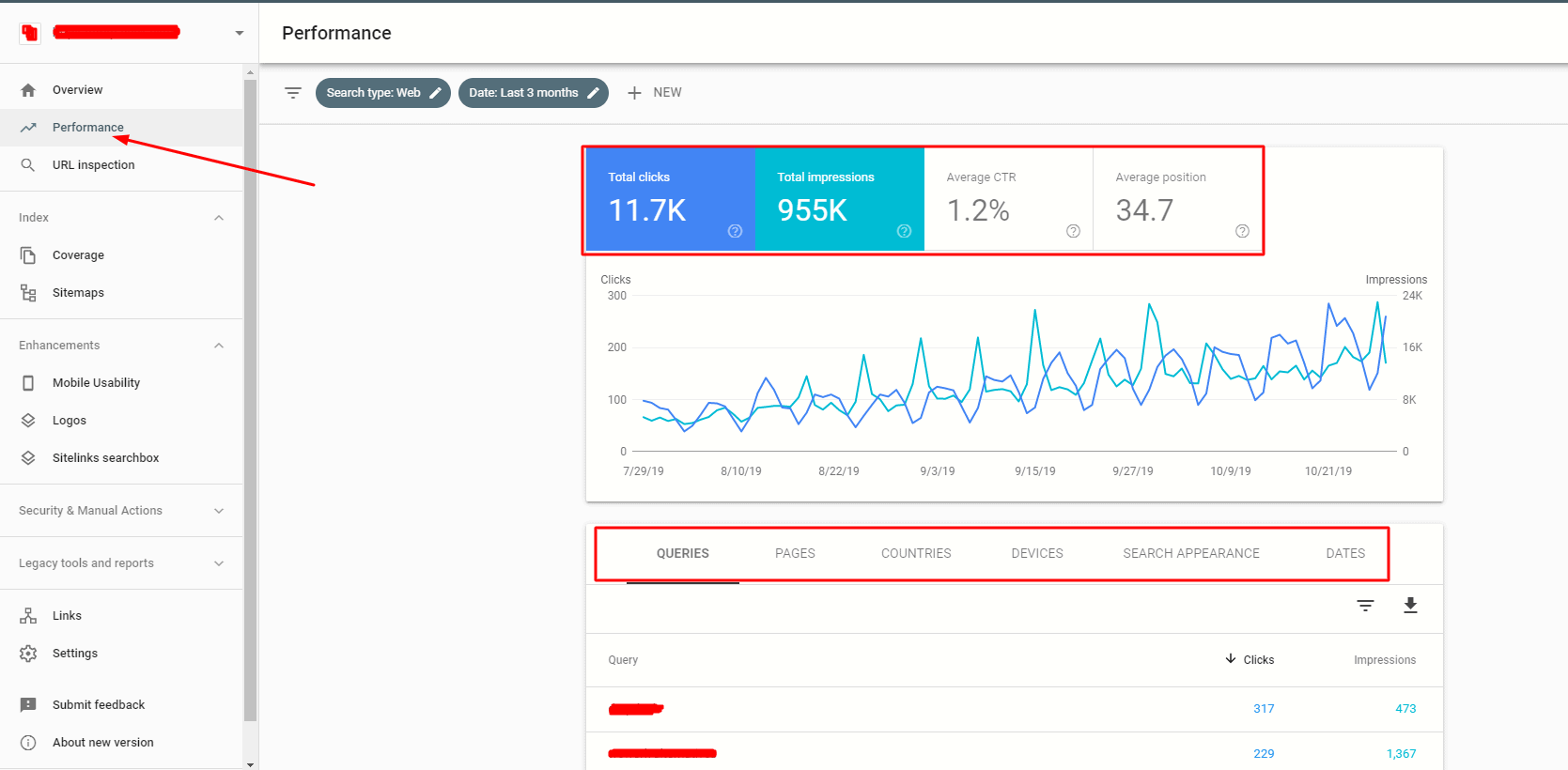
As shown above the report shows
- how many impressions vs clicks your website gets (CTR).
- what keywords your website currently ranks for
- how each page ranks (average positions)
- the devices users are searching from
This should give you a great idea of what your current website status is and what you need to improve on.
Step 2. Google Analytics
Another great way to determine your websites analytics would be to go to Google Analytics and navigate to the Organic Search report.
Tip: You need to embedd the analytics code and verify your site similar to the property steps (in Google Search Console). By adding the snippet of code to the <head> tag of your website you can easily view how users are engaging with your website.
If I have Google Search Console, why do I need analytics? Google Analytics provides a much more indepth breakdown of how your website it perfoming. You can view acquisition channels (how users are getting to you), bounce rates (users abruptly leaving your site), and track conversions or goals.

By looking at this 90 day report, we can see that organic traffic (unpaid) traffic is increasing nicely.
Step 3. Improve Your local presence
The easiest way to start ranking immediately in local directories is to build citations and create local profiles.
Google My Business
Did you know that 90% of the searches in the United States are done on Google? By simply listing and verifying your spaces with Google My Business, you can greatly enhance your visibility. Google automatically shows your local workspace to customers looking for your services, specifically in your area.
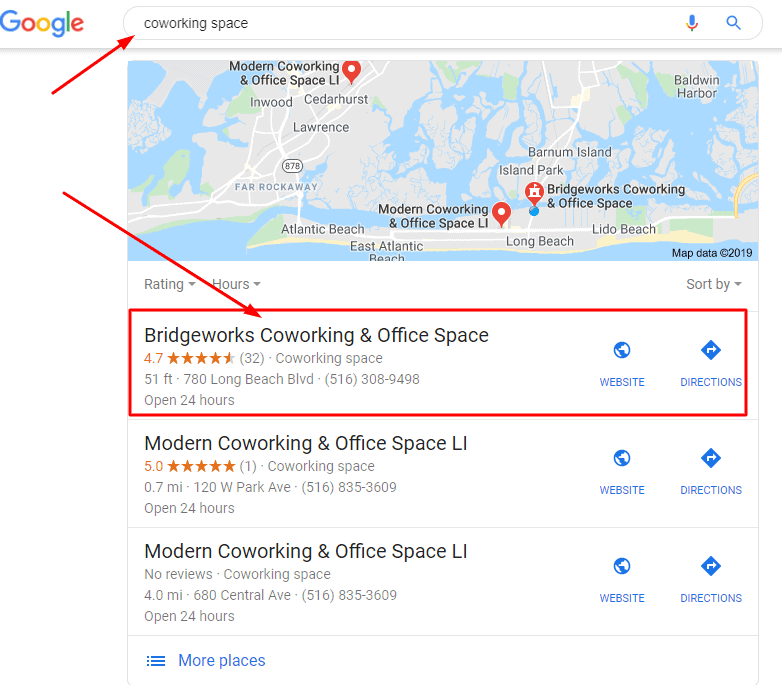
How to list your coworking space with Google My Business
Step 1. Visit Google My Business

Step 2. Add Your Business Name
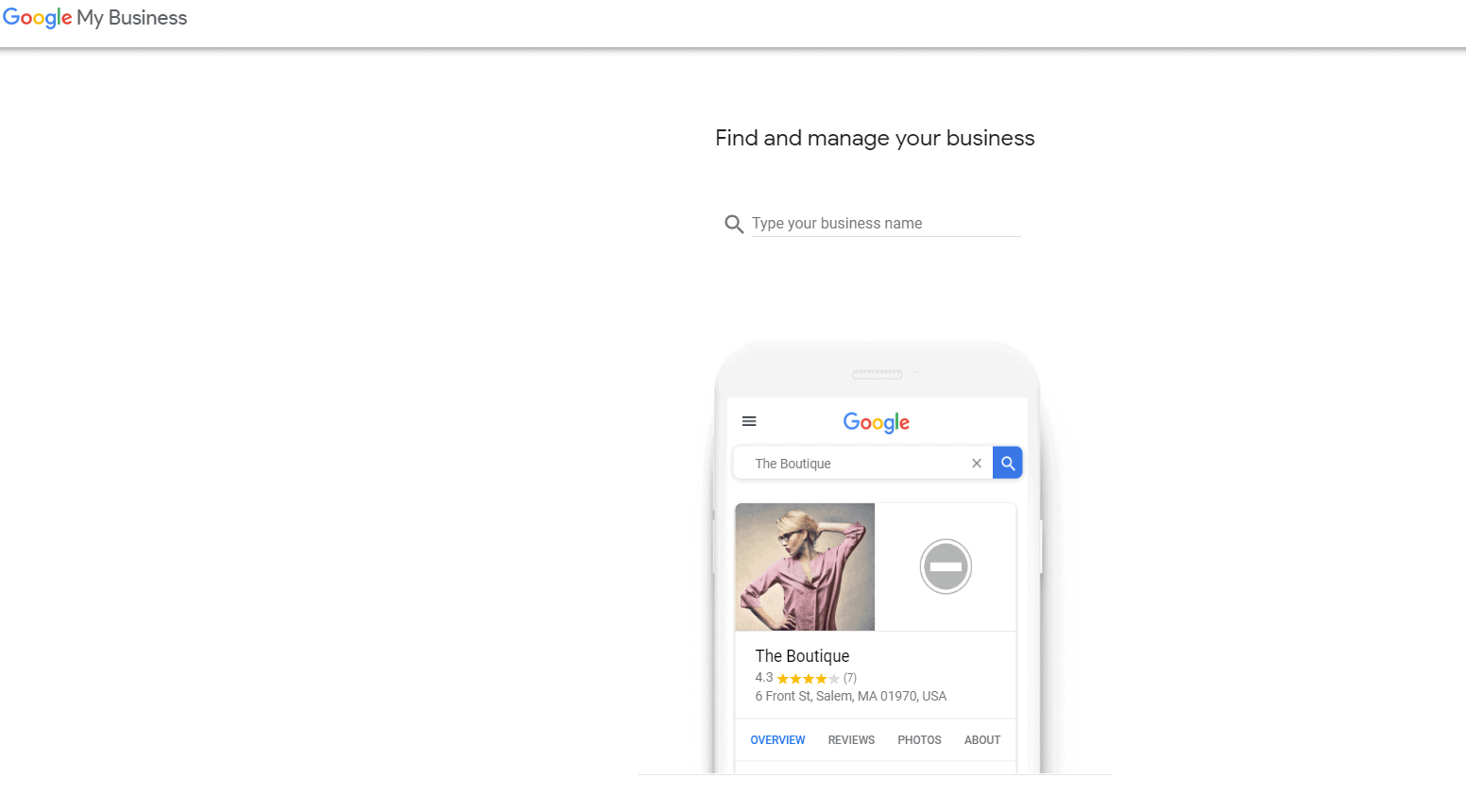
Step 3. Add Your Business Address and Services
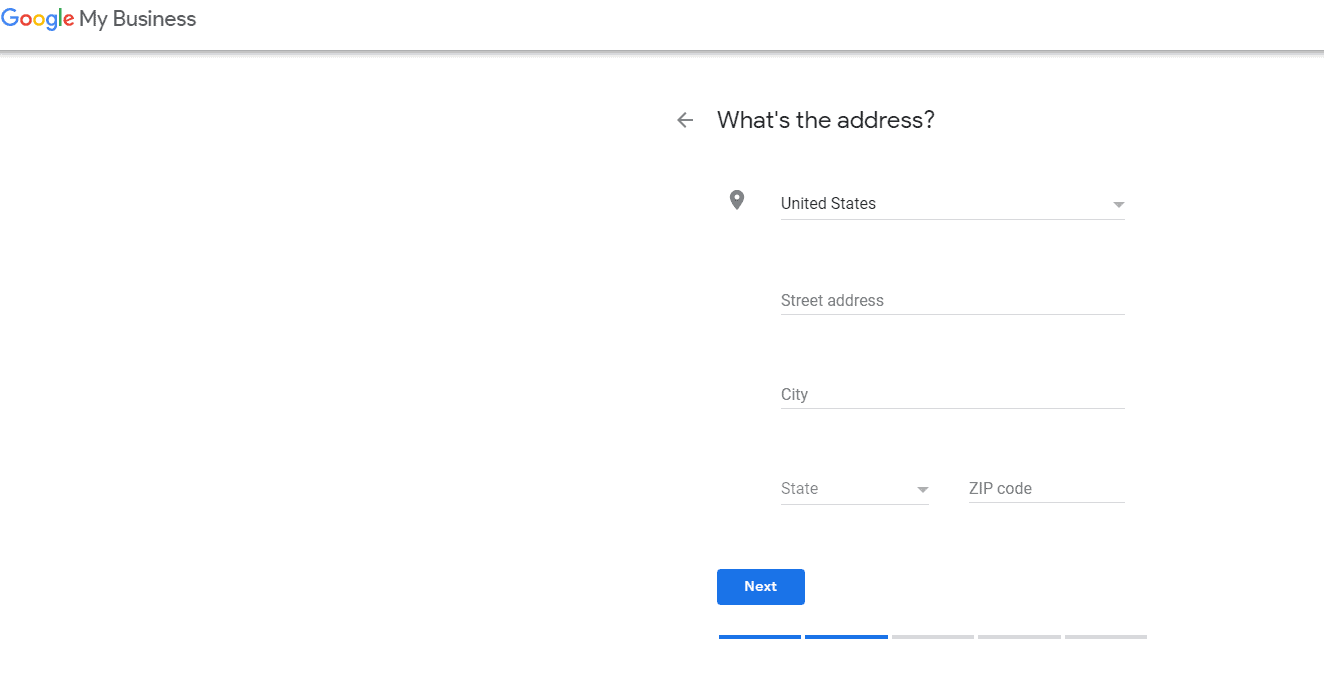
Step 4. Verify Your Business Listing
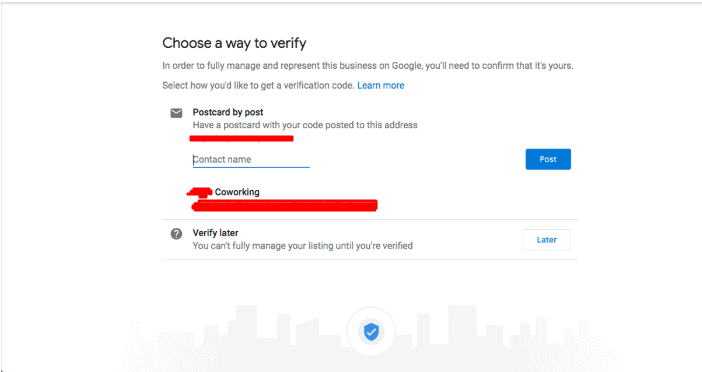
Basically, Google will send you a postcard to the address you listed for your coworking space with a 5 digit pin code. Once you receive the mailed letter all you need to do is log into your Google My Business account and enter the code.
How to optimize your coworking space on Google My Business
To ensure you put your best foot forward on being able to rank well on your local listing you need to make sure:
Add professional photos
- A profile photo (minimum 120 x 120; maximum 5200 x 5300).
- A cover photo (minimum 480 x 270; maximum 2120 x 1192).
- Additional photos (at least 4-5) preferably interior and exterior photos to really show off your space.
Add sub-categories
When creating your Google My Business listing you are asked to add a main category. Under your profile you have the option to add a few additional categories.
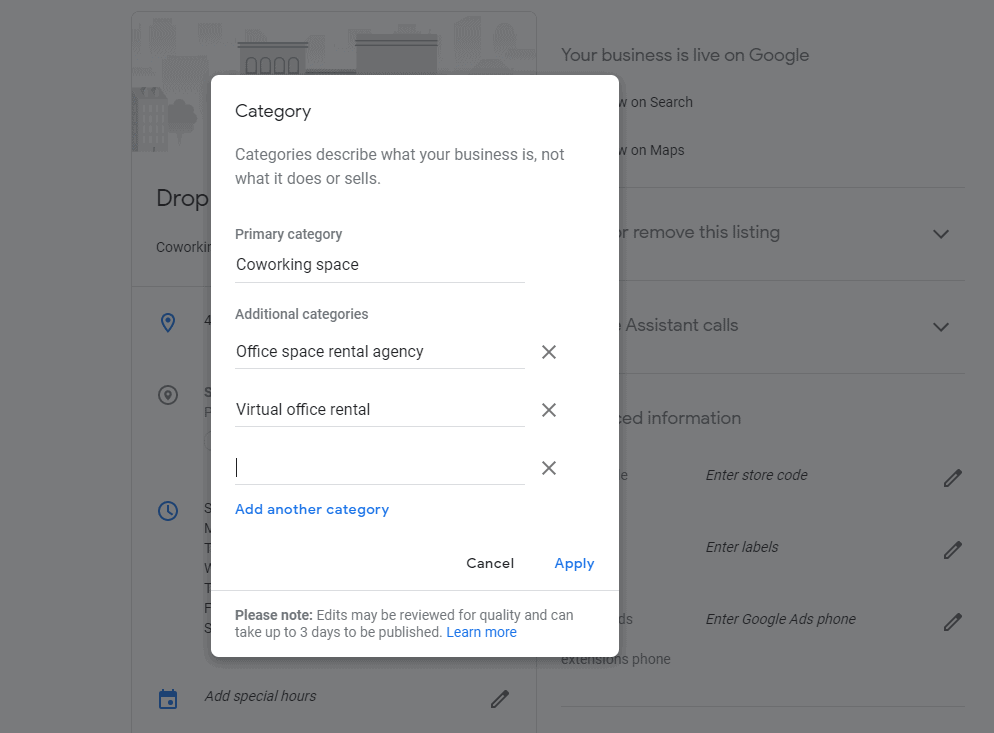
Add a complete business description
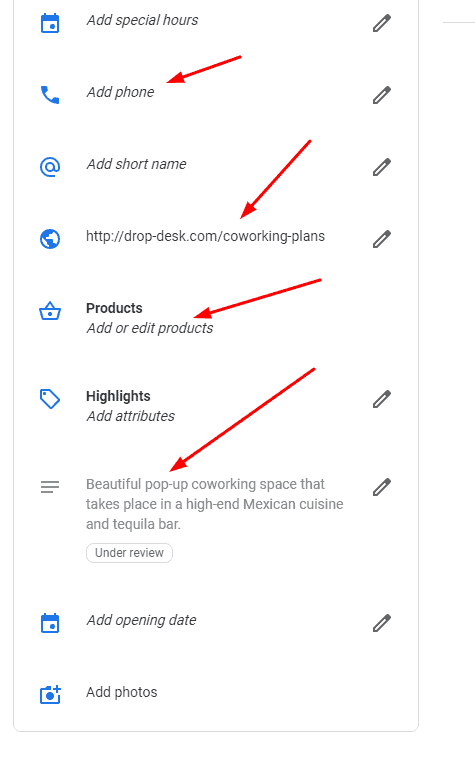
Be sure to add a concise yet informative business description that clearly outlines your business.
Add a clear call to action (CTA) with an up to date phone number and website link.
Ensure you have operating hours that match your business schedule.
List your product offerings under the product tab.
Tip: When entering your website’s URLs, use UTM parameters to keep track of how many people are going to your site from your Google My Business profile. This can be found under Google Analytics acquition report we showed earlier.
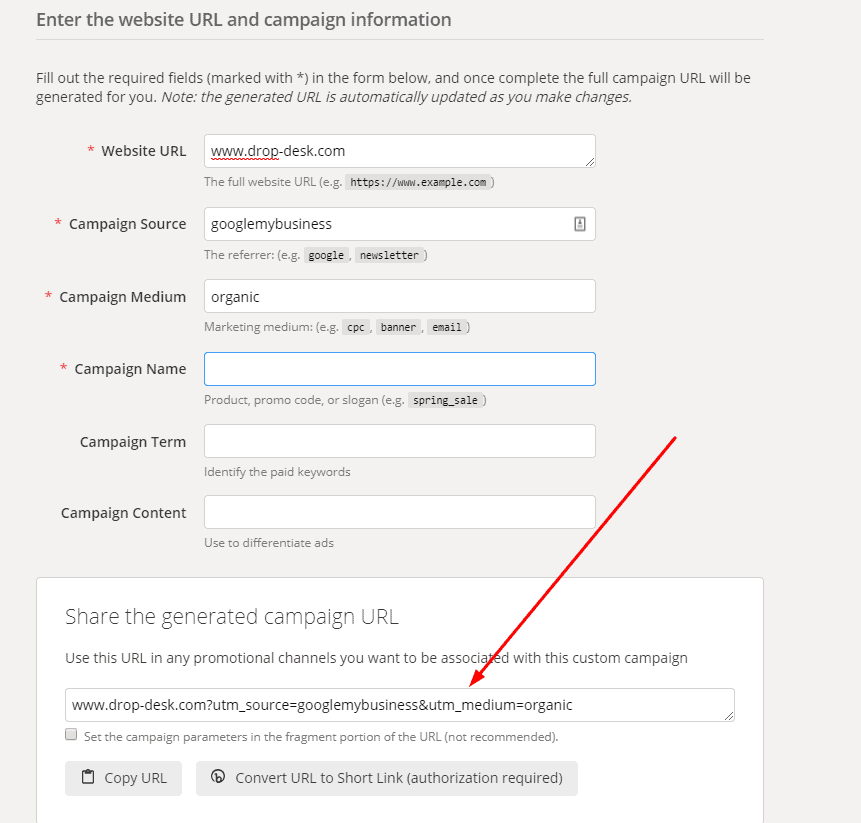
Reviews and Reputation Management
Social Proof is one of the most powerful marketing tools you can use to build trust with new customers. First and foremost, tt is essential to provide a great product. The next step is to use your happy customers to tell others about how great your coworking space is. You can do this by having customers rate your business on Google. More reviews = higher trust=higher you rank.

Dont just take our word for it. Check out Search Engine Lands Case Study on how reviews effected Google My Business Rankings.
What is a citation and how can it help rank your coworking space?
Ok, what is a citation? A citation is an online reference to your business’s name, address and phone number (NAP). Like links to your website, Google uses them when evaluating the online authority of your business.
Now that we have covered the basics the next step (once verified on Google My Business) is to create citations on different websties and directories. According to Moz, citations account for 11% of your local rankings. Although citations take time and may often seem repetive, it is crucial to the success of your coworking SEO strategy.
How to build citations for your coworking space
See the below lists of websites you can use to build thematic citations:
Yelp
Yellow Pages
LoopNet
Multiple Listings
Looking for more? Check out our full guide on where to list and find coworking spaces.
Ensure citations are accurate and consitent
Not sure how to check? Simply type in you “Business Name” + “NAP” (either your phone number, or address zip code).
Examples:
- “Business Name” + ”Phone Number”
- “Business Name” + “Address”
- “Business Name” + ”ZIP code”

And there we go. We can actively check our local citations by using the above formula. If you find there are incorrect citations or incosistencies, log in and correct them!
Coworking Space Keyword Research Tools
There are some great FREE tools you can use to find out what keywords will help you drive customers to your space.
- Google Search Console
- Google Trends
- Google Correlate
- Keywords Everywhere
There are also great paid tools you can use for premium features
Using the above list of tools will help find the necessary keywords you need to rank your coworking space. Now that you have an idea of what tools you can use how do we actually go about finding the right keywords?
How to find the best keywords for your Coworking Space
Lets use Bridgeworks (one of our location partners as an example).
Step 1. The first step to finding the best keywords for your coworking space is to look at your own website or other competitors sites. Break up each batch of keywords by product.
- Office Space
- Meeting Rooms
- Virtual Address
- Coworking Space
- Event Space
Step 2. Next create “long-tail” variations for these keywords. Since coworking is dependent on servicing customers in a set area, organizing the keywords by location and other synonyms are a great way to create your keyword list.
- Segment by State, City, Town (NY, Nassau County, Long Beach)
- Segment terms by other desciptos or identifiers such as (flexible, cheap, furnished or month to month).
Tip: To make sure your strategy is on point a great way to check and enhance your keyword list is to compare you keywords strategy to you competitors. Run a competitor keyword gap analysis or content gap anlaysis to determine what your competitors are ranking for.
Once you have gathered your keywords list, you should create an excel document (or Google Sheet), where you can organize each keyword by keyword difficulty. To summarize, not all keywords are created equal. Most keywords especially the keywrods tied to transactional intent are much harder to rank for (as every compeittor is targetting the same term).
Example: What term should I try to target if I have a new coworking space?
In the image we are using Ahrefs keyword explorer tool to determin KD (keyword diffuculty), Volume (amount of searches and clicks), and the average cost per click.

If you answered option number three you are correct!


Since the keyword is less competitive, a brand new coworking website has a much better chance at ranking for the term “coworking space long island”.
What determines keyword difficulty and my ability to rank?
To simplify a very complicated process, the ability to rank come down to a few items
- Website Authority
- Unique Referring Domains
- Website Relevance
- Great Content
Building authority is very important for your coworking space to rank for more competitve keywords. Authority is really synomous for trust. So how do you build authority?
If you’ve read anything on SEO you’ve probably heard that you need links (referring domains) in order to rank for your desired keywords. It is this constant ongoing process of building links to your domain and subpages that drive results for SEO. A unique link acts as social proof to Google that your website is what you say it is. Google follows these anchor links (specific links to a url) and measures these links based on the anchor text (text embedded witin the link) to determine the accuracy of the content.
Now that we have learned about how authority within a set industry is created, how can we measure the amount of referring domains needed to rank? Lets use the same example.
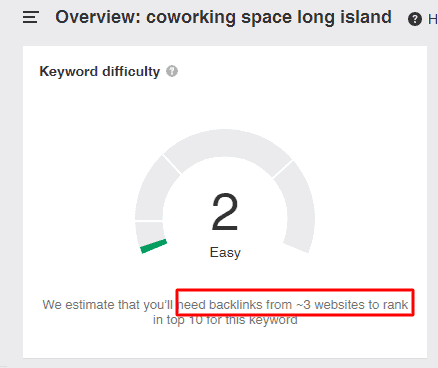
Based on an estimation from Ahrefs, we can determine that we would need around three unique websites linking to our page in order to rank it for “coworking space long island”. Lets dive deeper into the same keyword.
 100vw, 853px” data-lazy-src=”https://drop-desk.com/wp-content/uploads/2019/10/SERP-report.png”></figure>
<figure><img decoding=)
If we have a look at the Domain Authority (DA) page and amount of referring domains to each page we can see that the website with the highest authority is actually easier to rank for the keyword (even with less referring domains).
Summary: Referring domains are important, but so is your overal trust (authority).
Looking To Rank Your Coworking Space?
Book a call with us and learn how we can help.
